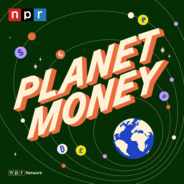From nuclear fission to GPS to the internet, it’s common knowledge that many of the most resource intensive technologies of the last century got their start as military R&D projects in government-funded labs. But as Avery Trufelman explains in her fashion history podcast, Articles of Interest, the influence of the US military is, in many ways, even more intimate than that, shaping much of the clothing we all wear everyday. On today’s show, a tale of Army surplus economics. How military designs trickled down from the soldiers on the front lines to the hippies on the war protest line to the yuppies in line at Banana Republic. And why some of your favorite outdoor brands may just be moonlighting as U.S. military suppliers, while keeping it as under the radar as they can.Pre-order the Planet Money book and get a free gift. / Subscribe to Planet Money+Listen free: Apple Podcasts, Spotify, the NPR app or anywhere you get podcasts.Facebook / Instagram / TikTok / Our weekly Newsletter.This episode of Planet Money was produced by Luis Gallo, edited by Jess Jiang, fact checked by Yasmine Alsayyad, and engineered by Robert Rodriguez. Alex Goldmark is Planet Money’s executive producer.Articles of Interest is produced by Avery Trufelman, edited by Alison Beringer, fact checked by Yasmine Alsayyad, and engineered by Jocelyn Gonzalez.Learn more about sponsor message choices: podcastchoices.com/adchoicesNPR Privacy Policy

Wirtschaft
Planet Money Folgen
Wanna see a trick? Give us any topic and we can tie it back to the economy. At Planet Money, we explore the forces that shape our lives and bring you along for the ride. Don't just understand the economy – understand the world.Wanna go deeper? Subscribe to Planet Money+ and get sponsor-free episodes of Planet Money, The Indicator, and Planet Money Summer School. Plus access to bonus content. It's a new way to support the show you love. Learn more at plus.npr.org/planetmoney
Folgen von Planet Money
355 Folgen
-
Folge vom 10.12.2025Strange threadfellows: How the U.S. military shaped what we all wear
-
Folge vom 05.12.2025How hurricanes became a hot investmentA few years ago, the Jamaican government started making an unusual financial bet. It went to investors around the world asking if they'd like to wager on the chances a major hurricane would hit the island in the next couple of years. In finance terms, these kinds of wagers are called "catastrophe bonds." They're a way to get investors to share the risk of a major disaster, whether that's a Japanese earthquake, a California wildfire, or a Jamaican hurricane. This market for catastrophe has gotten really hot lately. And it’s changing the way that insurance works for all of us. Pre-order the Planet Money book and get a free gift. / Subscribe to Planet Money+Listen free: Apple Podcasts, Spotify, the NPR app or anywhere you get podcasts.Facebook / Instagram / TikTok / Our weekly Newsletter.This episode was produced by Willa Rubin and edited by Marianne McCune. It was engineered by Jimmy Keeley and Kwesi Lee. Fact-checking by Sierra Juarez and Vito Emanuel. Alex Goldmark is our executive producer.Music: Universal Music Production - “Lagos to London,” “Sleazy Does It,” “The Sundown Set.”Learn more about sponsor message choices: podcastchoices.com/adchoicesNPR Privacy Policy
-
Folge vom 03.12.2025Is AI slopifying the job market? (Two Indicators)Vote for us in NPR’s People’s Choice Awards: npr.org/peopleschoice AI is already reshaping how people find work. Fewer entry-level jobs, robot recruiters, and ever-changing new skill requirements all add up to a new, daunting landscape for humans trying to find dignified work.Today on the show: two stories from the edges of a changing labor market. First we’ll assess claims that AI is causing a white collar job apocalypse. What does the data actually say? We meet an economist who has found one small but fascinating way to measure the impact of AI on workers. Then, we go face-to-face, or at least voice-to-voice, with AI. We meet a robot recruiter for a job interview and find cause to ask, ‘When might that actually be preferable to a human recruiter?’Pre-order the Planet Money book and get a free gift. / Subscribe to Planet Money+Listen free: Apple Podcasts, Spotify, the NPR app or anywhere you get podcasts.Facebook / Instagram / TikTok / Our weekly Newsletter.The original Indicator episodes were hosted by Wailin Wong, Darian Woods, and Adrian Ma. They were produced by Cooper Katz McKim and engineered by Robert Rodriguez and Debbie Daughtry. They were fact checked by Sierra Juarez. They were edited by Paddy Hirsch and Kate Concannon. Learn more about sponsor message choices: podcastchoices.com/adchoicesNPR Privacy Policy
-
Folge vom 28.11.2025Capitalism (Taylor's Version) (25-minute Podcast Version)Taylor Swift reaches new heights with her latest album, which is both divisive and record-breaking. And it’s fueled by an elaborate series of business choices that propel profits but also chart numbers. Today’s episode comes from our friends at Today Explained, Vox’s lively, smart daily news podcast. Pre-order the Planet Money book and get a free gift. / Support our show. Subscribe to Planet Money+Listen to Planet Money free: Apple Podcasts, Spotify, the NPR app or anywhere you get podcasts.Facebook / Instagram / TikTok / Our weekly Newsletter.This episode was hosted by Noel King. It was produced by Ariana Aspuru, edited by Amina Al-Sadi, fact-checked by Laura Bullard, and engineered by Adriene Lilly.Learn more about sponsor message choices: podcastchoices.com/adchoicesNPR Privacy Policy
